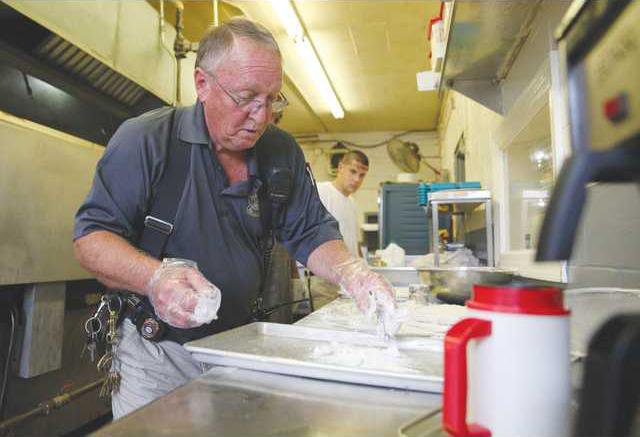The restaurant business burned out Jim Lockaby, whose culinary savvy behind a stove has been seen on an Alaskan oil rig and the Cleveland Dairy Queen Brazier.
“Working seven days a week, almost seemed like 24 hours a day, there from daylight til dark, just got burnt out. Just wanted to try something different,” he said.
Lockaby locked up Jim’s Family Restaurant in Murrayville and traded it for a set of jailhouse keys at the Hall County Correctional Institute to become a correctional officer in 1995.
The job Lockaby wanted, he said, was the food service director at the prison, but the seasoned veteran of seasoning was told the job would be an internal promotion.
There was, however, a job opening as a correctional officer.
“I’ve never been locked up in my life,” Lockaby said. “I didn’t even know what the inside of a jailhouse looked like.”
Lockaby spent eight months turning keys in the prison before the job was open again.
“I have a love for cooking and I enjoy it. I wish could have gone to a culinary school, but I wasn’t fortunate enough to do that,” he said.
Lockaby’s cooking began at 14 flipping hamburgers at the Dairy Queen for 50 cents per hour.
Five years later, he would marry his high school sweetheart Joyce and eventual restaurant partner.
“We kind of raised each other, being just kids when we got married,” Lockaby said, who celebrated his 50th wedding anniversary in March.
Lockaby supervises 18 in the kitchen that produces an estimated 250,000 meals per year.
“He’s a well-seasoned officer and really does an exceptional job at providing a variety of meals for the inmates — and a good meal at that,” Warden Walt Davis said. “We work these guys hard on work details, and they come in hungry.”
Inmates Steven Crane and Trenton Rice work in a utility fashion by keeping up with inventory, changing the oil in the fryers and helping things run smoothly for Lockaby and the other kitchen staff.
Crane, who has been to other prisons, said he appreciates the quality under Lockaby.
“They’ll starve you at other prisons,” Crane said, who had experience in a food warehouse before his incarceration. “Their food is garbage.”
Though not a requirement, some of the inmates working in the kitchen have real-world experience, such as James Jordan. Jordan, who now makes desserts, attended culinary school for cuisine.
Others in Lockaby’s time in the kitchen demonstrated less ability.
“We’ve had some come in here and didn’t know how to boil water,” he said.
The meals for the inmates rotate on a monthly basis, with the menus approved by a certified dietician. Davis said the dietary plans are submitted to the Department of Corrections for approval.
“I always tell everybody they eat better here than I do at home,” Lockaby said. “They get three squares, and a lot of nights I eat a sandwich and have a drink.”
At home, Lockaby said it’s an even split on cooking, saying he enjoys his wife’s cooking as much as he does his own.
Because of the work details, the menus have to be at least 2,000 calories, containing meat, three vegetables, dessert and bread.
If something backfires or breaks down in the kitchen, Lockaby and the staff have to think on their feet.
“You can’t feed 50 fish, and then turn around and feed 175 and give them a hamburger,” Lockaby said. “You have to feed everybody the same thing.”
When assuming control of the kitchen nearly 20 years ago, Lockaby said he learned that carrying a big stick wasn’t going to get him very far.
“Even though they have committed crimes and done things that they shouldn’t have, it’s our job to help them to be productive citizens for whenever they get out,” he said.
Crane said he has turned down other work details to continue his time in the kitchen with Lockaby.
“You get a good detail and good people to work with — that’s hard to come across,” he said.
Some of Lockaby’s former kitchen staff have had success since leaving prison working in commercial kitchens.
“They stay in touch and call every now and then tell me how much they appreciate what I did for them and what they learned in here and how they were putting it to use out there. It makes you feel good,” Lockaby said.




